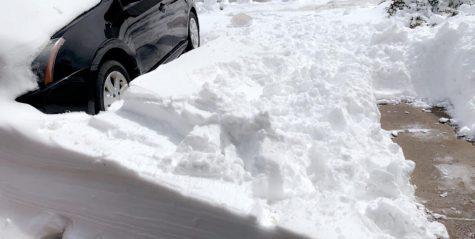Denver Hit by Bomb Cyclone
April 15, 2019

Image Courtesy of Oliver Godfrey
Just before EHS spring break kicked-off, a huge snowstorm went right through Colorado. The storm carried snow, but it was high winds that made the storm dreadful. The National Weather Service declared the storm a “bomb cyclone.” A bomb cyclone, also known as a bombogenesis or a explosive cyclogenesis, is a winter storm in which the atmospheric pressure (barometric pressure) drops by 24 millibars within 24 hours. The drop of the atmospheric pressure causes a storm to intensify at an extreme rate. Many drivers were stranded on the roads, and almost every interstate that ventured out from Denver was closed due to the conditions and stranded drivers.
Colorado was not the only state to be ravaged by the bomb cyclone. In Dodge City, Kansas, a 100 year record was broken for the lowest atmospheric pressure, according to the National Weather Service in Dodge City. In Nebraska, there is severe flooding throughout the state, with 81 out of 93 counties in Nebraska under an emergency declaration according to the Nebraska Emergency Management Agency.
Severe storms such as this seem to appear much more often as time goes on. Deadly hurricanes, such as Harvey, Irma, and Maria, devastated Southeast Texas, Florida, and Puerto Rico all within a span of 2 months between August and October of 2017. There was also the recent polar vortex in January, 2019. The Weather Channel stated that it was the “Coldest Arctic Outbreak in at least two decades in parts of the Midwest.”
The amount of significant storms cannot be only a coincidence. There are many factors contributing to this extreme weather–including climate change. Climate change is currently described as the Earth’s atmosphere warming up due to the increased levels of carbon dioxide. However, the topic of climate change is considered by many as a matter of opinion. There are many in the world that believe that climate change does not exist. There are many excuses against climate change, such as events of cold weather as to say that the world is not warming, but getting colder. However, this is inaccurate.
The impact of climate change is real and is starting to show. Extreme weather, including cold weather, is an effect of climate change. For example, according to the World Resources Institute, the warmer temperatures in the arctic weaken the jet stream and thus the warm subtropical air mixes with the arctic air, which can lead that air down as far south as the United States. NASA has stated that the number of record highs, as well as record lows, have increased since 1950. Considering these trends, climate change will very well continue for the foreseeable future. The question now is: Will the effects become more severe?







